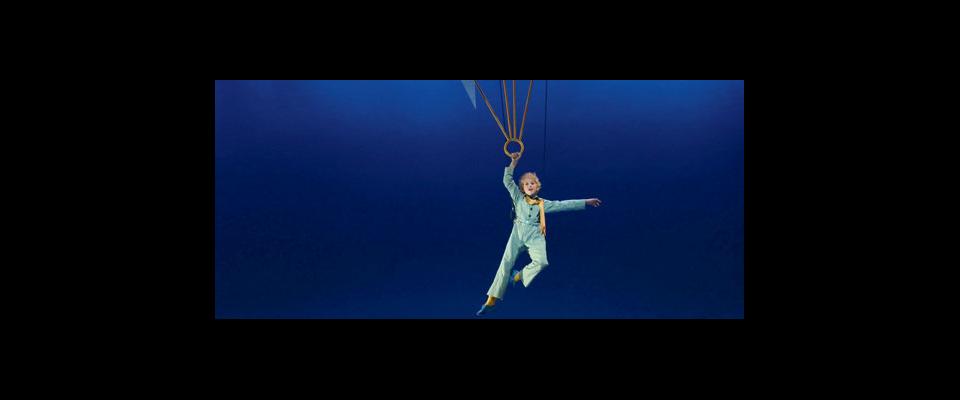The Little Prince lands at Zellerbach.
Rachel Portman journeyed by camel through the Sahara desert when she began composing her opera The Little Prince. She wanted to know what it felt like to be stranded in that desolate land, like the downed pilot in Antoine de Saint-Exupéry’s beloved book. “I needed to listen to the sound of the desert,” recalls Portman, who has composed more than 70 film scores and was the first woman composer to win an Oscar for original music (for Emma in 1996). “It was a gentle breeze. I wanted to capture the feeling of all that in the music,” Portman says. “And I wanted to see the stars at night.”
But cinematic atmosphere is just one among the attractions Portman captured in her adaptation of the 1943 book. Operas for children are rare; Portman wanted to go one better with a production that would delight both kids and adults, and she chose the perfect subject. Saint-Exupéry’s classic tells the charming story of a pilot who, stranded in the desert, encounters a preternaturally wise boy from a tiny planet.
At first publication, The Little Prince befuddled Saint-Exupéry fans and critics with its childlike simplicity. The boy tells the pilot of his adventures traveling from planet to planet, encountering all stripes of foolish and selfish characters while longing for his beloved rose. The cast is whimsical: a talking fox who warns that “you become responsible, forever, for what you have tamed” and a snake who offers a fatal bite that will send the Little Prince home. But time has proven that the book’s philosophically profound lessons can stir even the most knowing parents. “It’s about the afterlife,” acclaimed director Francesca Zambello says. “That’s what the Little Prince represents. Or about connecting with your subconscious. There are so many interpretations. But at bottom, it’s a joyful piece, a celebration of life.”
It might seem that The Little Prince’s power as pure fantasy is behind the opera’s overwhelming popularity since its 2003 debut at the Houston Grand Opera, with performances everywhere from New York to Lithuania, including one recorded by the BBC. The late Maria Bjørnson’s whimsical sets create an airy pastel landscape with all kinds of surprise doors and unexpected perches for such crazy creatures as walking, talking baobab trees. The stage dressing has fewer big effects than many operas but never skimps on delight, from hunters with gigantic potbellies to a golden-haired, exuberantly petalled rose.
Amid all the visual bedazzlement, kids also get the message, attests Portman, a mother of three. “Even children understand that the Little Prince has died. My daughter was very, very moved by the moment when the Prince left,” the British-born composer says by phone from Minneapolis, where she was working with Zambello on a new musical based on the Little House on the Prairie books.
Perhaps children understand because Portman has made sure to keep them constantly engaged. In addition to its firmament of professional singers (several of them in the upcoming Zellerbach performances graduates of the San Francisco Opera’s prestigious Adler Fellowship program), The Little Prince uses a chorus of 24 children—”children love to see other children onstage,” Portman says. And the title role is sung by a boy soprano. “That was questioned—it’s a heavy role. But my solution was just to keep his responses very short.” It’s the Pilot, to be sung by Eugene Brancoveanu, who moves the story along and does the vocal heavy lifting. Still, the beautiful Prince with his angelic face and sweet wisdom—lines such as “What makes a desert beautiful is that somewhere it hides a well”—is a choice role for 12-year-olds Tovi Wayne and Tyler Polen, who will alternate in the part.
The episodic nature of Saint-Exupéry’s book did present challenges. Portman, working with librettist Nicholas Wright, a prolific British playwright, drew upon her movie score experience to keep the pacing brisk. Her slightly outsider status in the classical music world—this was her first opera—may have given her an advantage in keeping the music for The Little Prince accessible and family friendly. And that immediately appealed to David Gockley, then general director of the Houston Grand Opera, when Portman and Zambello first came to him with their project.
“I knew Rachel’s film music, and when I learned she wanted to take this on I knew she wasn’t going to try to prove she was really a 12-tone composer,” Gockley says. “I knew she’d just be herself.”
Zambello puts it differently. “Her musical language is very simple,” she says. “It has a lot of melody; it’s music you remember, that motivates the drama forward.”
Gockley is now director of the San Francisco Opera, where he’s made a splash with “opera for the masses” initiatives such as a free simulcast at AT&T Park. The Little Prince’s Zellerbach Hall dates launched a new 50-50 partnership between Cal Performances and the San Francisco Opera, with more such productions—including the West Coast premiere of Jake Heggie’s new opera Three Decembers (Last Acts) in December—to come.
“This arrangement is a big deal,” says Robert Cole, director of Cal Performances since 1986. “Some people might see our work as competitive, but there’s not a finite audience for what we do.” Cole adds, “This idea of getting opera out in a broader way—David’s on the leading edge of that and we want to be a part of it.”
The alliance was born in large part of practicality, with Gockley seeking a venue to keep the Opera active during its usual downtime when the ballet takes over San Francisco’s War Memorial Opera House. But Gockley’s selection of The Little Prince couldn’t be more ideal for furthering a key Cal Performances goal: reaching family audiences.
When he retires next year, Cole expects the new connection to be one of his proudest legacies. “I’m doing everything I can to make sure this carries on,” he says. “Having someone like David around will make it possible. We’ve made a good start.”
Meanwhile, families all over the Bay Area have the chance to see an opera as inspiring as it is intergenerational.



















